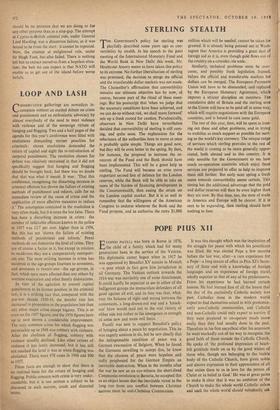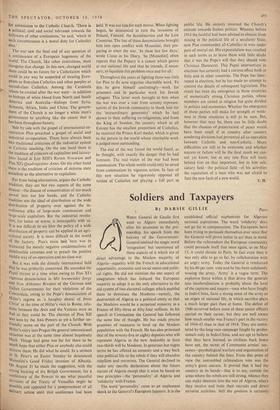POPE PHIS XII
EuGENio PAcEut was born in Rome in 1876, the child of a family which had for many generations been in the service of the Vatican. His diplomatic career began when in 1917 he was appointed by Benedict XV nuncio in Munich —a post which in fact gave him jurisdiction in all Germany. The Vatican outlook towards the 1914 war was inevitably one of some detachment. It could hardly be expected to see in either of the belligerent groups the immaculate defenders of all good against all evil, and its fear was that, what- ever the balance of right and wrong between the contestants, a long-drawn-out war and a 'knock- out' blow would lead not to the real victory of either side but rather to the emergence in strength of some new and more evil force.
Pacelli was sent to support Benedict's policy of bringing about a peace by negotiation. This he was eagerly anxious to do, but he saw clearly that the indispensable condition of peace was a German evacuation of Belgium. When he found the Germans unwilling to accept this, he knew that the chances of peace were hopeless and sadly prophesied for the German Empire an inevitable destruction. When in the months after the war he saw as an eye-witness the short-lived Communist revolution in Bavaria, he accepted this as an object lesson that the inevitable victor in the long run from any conflict between Christian nations must be anti-Christian Communism. It was this thought which was the inspiration of the struggle for peace with which his pbntificate was filled. He was elected Pope a few months before the last war, after—a rare experience for a Pope—a long tenure of office as Pius XI's Secre- tary of State and with a knowledge of foreign languages and an experience of foreign travel, wholly superior to that of any of his predecessors. From his experience he had learned certain lessons. He had learned first of all the lesson that the day of the exclusively Catholic society was past. Catholics must in the modern world expect to find themselves mixed in with predomin- antly non-Catholic communities, and Catholic and non-Catholic could only expect to survive if they were prepared to co-operate much more easily than they had usually done in the past. Therefore in his first encyclical after his accession he went markedly out of his way to recognise the good faith of those outside the Catholic Church. He spoke of 'the profound impression of heart- felt gratitude made on us by the good wishes of those who, though not belonging to the visible body of the Catholic Church, have given noble and sincere expression to their appreciation of all that unites them to us in love for the person of Christ or in belief in God.' He was at great pains to make it clear that it was no ambition of the Church to make the whole world Catholic unless and until the whole world should voluntarily ask for submission to the Catholic Church. 'There is a political, civil and social tolerance towards the followers of other confessions,' he said, 'which in such circumstances is a moral duty for Catholics also.'
The war saw the final end of any question of a continuance of a European hegemony of the world. The Church, like other institutions, must recognise that change. In this new, changed world there could be no future for a Catholicism which could in any way be suspected of treating Euro- peans as first-class Catholics and other peoples as second-class Catholics. Among the Cardinals whom he created after the war were—in addition to bishops of white blood from North and South America and Australia—bishops from Syria, Armenia, Africa, India and China. The govern- ment of the Church is no longer a white man's government to anything like the extent that it has been throughout history.
Side by side with the gospel of international co- operation Pius preaChed a gospel of social and industrial co-operation. There have always been two traditional criticisms of the industrial system in Catholic teaching. On the one hand there is the tradition of criticism of capitalism and laissez- faire found in Leo XIII's Rerum Novarum and Pius XI's Quadragesimo Anna. On the other hand there is the tradition of criticism of extreme state socialism as the alternative to capitalism.
Far from being alternatives, argues the Catholic tradition, they are but two aspects of the same disease—the disease of concentration of too much Power into too few hands, and the Catholic tradition sets the ideal of distributism or the wide distribution of property over against the in- ordinance alike of large-scale communism and large-scale capitalism. But the industrial revolu- tion, for better or worse, is inescapably with us. It is not difficult to see hbw the policy of a wide distribution of property can be applied in an agri- cultural society. It is more difficult in the world of the factory. Pius's main task here was to transcend the merely negative condemnations of indefensible extremes and to preach the positive middle way of co-operation and no class war.
But it was with the directly international field that he was primarily concerned. He ascended the Papal throne at a time when owing to Pius XI's vigorous denunciation in Mit brennender Sorge and Non A ',Mama Bisogno of the German and Italian Governments for their violations of the Concordats, owing to the Pope's denunciation of Hitler's regime as 'a haughty denial of Jesus Christ' at the time of Hitler's visit to Rome, rela- tions between the Axis and the Vatican were as bad as they could be. The election of Pius XII Was seen by the Axis Powers as yet a further un- friendly move on the part of the Church. With Hitler's entry into Prague the general international situation was at the same time almost hopelessly black. Things had gone too far for there to be much hope that either Pius or anybody else could retrieve them. He did what he could. In a sermon in St. Peter's on Easter Sunday' he denounced Mussolini's Good Friday invasion of Albania. On August 31 'he made the suggestion, with the strong backing of the British Government, for a conference of the Powers to see what peaceful revisions of the Treaty of Versailles might be Possible and appealed fora postponement of all Military action until that conference had been held. It was too late for such moves. When fighting began, he denounced in turn the invasions of Poland, Finland, the Scandinavian and the Low Countries. The last of these denunciations brought him into open conflict with Mussolini, then pre- paring to enter the war. 'In these last few days,' wrote Ciano in his Diary, 'he [Mussolini] often repeats that the Papacy is a cancer which gnaws at our national life and that he intends, if neces- sary, to liquidate this problem once and for all.'
Throughout the years of fighting there was little for Pius to do save organise charitable work. To this he gave himself unstintingly—work for prisoners and in particular work for Jewish refugees. This latter work brought to him when the war was over a visit from seventy represen- tatives of the Jewish community to thank him for the 'extraordinary generosity' which he had shown to their suffering co-religionists, and from the King of Sweden, the country which in all Europe has the smallest proportion of Catholics, he received the Prince Karl medal, which is given to the person in the world whose charitable work is judged most outstanding.
The end of the war found the world faced, as he thought, with exactly the danger that he had foreseen. The reap victor of the war had been communism. The whole world could only be saved from communism by vigorous action. In face of this new situation he vigorously opposed all notion of Catholics not playing a full part in public life. He entirely reversed the Church's attitude towards Italian politics. Whereas before 1914 the faithful had been advised to abstain from mixing in the political life of a secularist State, now Pius commanded all Catholics to vote under pain of mortal sin. His expostulation was couched in such terms as to leave them with little doubt that it was the Pope's will that they should vote Christian Democrat. This Papal intervention in elections has certainly had a curious effect both in Italy and in other countries. The Pope has inter- vened in elections, but he has made no attempt to control the details of subsequent legislation. The result has been the emergence in those countries of numerically strong Christian parties, whose members are united in religion but quite divided in politics and economics. Whether the emergence of those parties will make for strength or weak- ness in those countries is still to be seen. But, however that may be, there can be little doubt that the chances of, preservation of peace would have been small if in country after country sundering divisions had prevented all co-operation between Catholic and non-Catholic. Many difficulties are still to be overcome and whether success or failure will be the final result we can- not yet know, but at any rate Pius will leave behind him on that important, but to him sub- sidiary field—the political field—of his activities the reputation of a man who was not afraid to



































 Previous page
Previous page